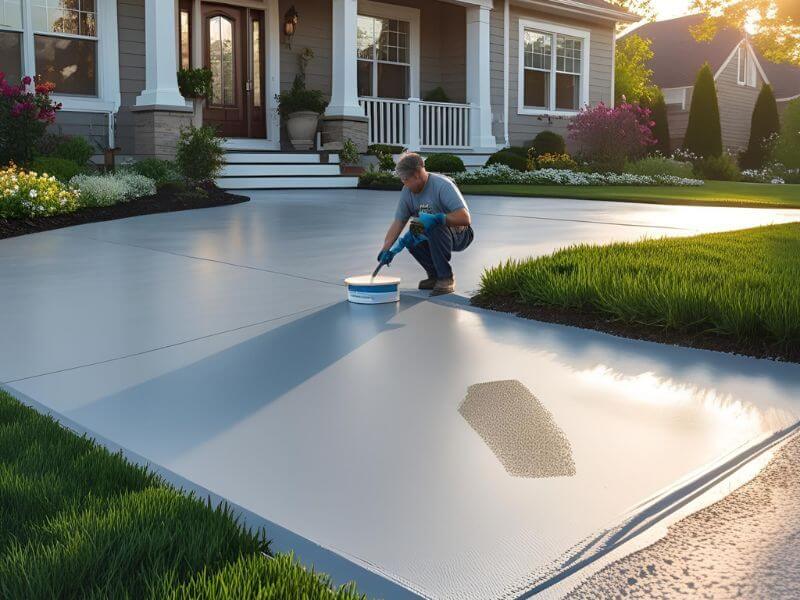
When we complete a concrete painting project at Driveway Painting, one of the most common questions from both domestic and commercial clients is whether sealing is necessary. The short answer is yes, but understanding why makes all the difference to your investment's longevity.
Sealing painted concrete surfaces isn't just recommended practice - it's essential protection that can extend the life of your surface by up to 300%. Without proper sealing, even the best paint job becomes vulnerable to premature failure, with industry estimates suggesting that up to 40% of painted concrete failures occur due to improper or missing sealing.
Concrete is naturally porous, capable of absorbing 3-5% of its weight in water. When you apply paint to concrete floors or outdoor concrete surfaces, you're creating a decorative layer that needs protection from moisture, UV damage, and daily wear. This is where sealing becomes critical.
We've seen countless painted concrete floors deteriorate rapidly because the sealing step was skipped. Moisture penetrates through microscopic gaps, causing the painted surface to bubble, peel, and eventually fail completely. In the UK's damp climate, this problem becomes even more pronounced.
Professional painters understand that sealing acts as the final defence layer. Do you need to seal concrete after painting? Think of it like washing your car but skipping the wax – you've done most of the work, but you're missing the crucial protective element that makes everything last longer.
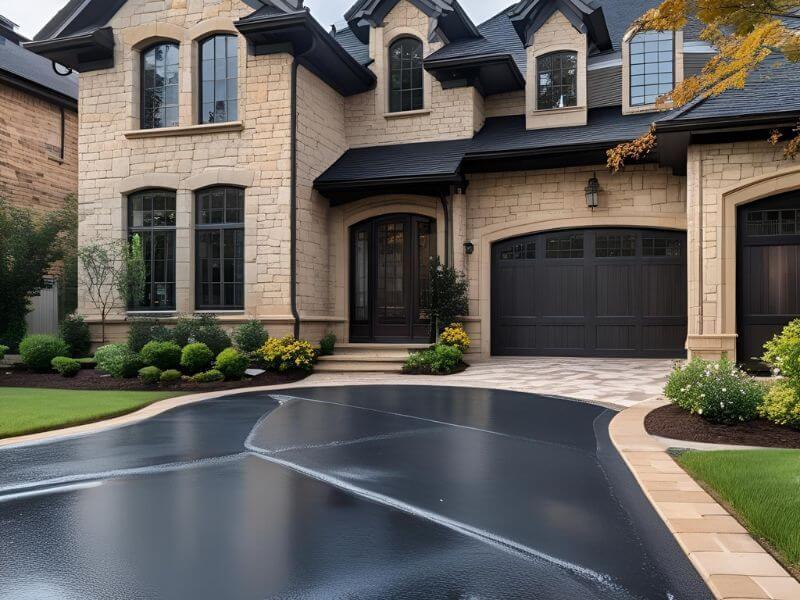
Not all concrete sealers are created equal. When we prepare concrete surfaces for painting, we consider several sealer types, each with specific benefits for different applications.
Acrylic Sealers: These work exceptionally well over acrylic latex concrete paint and provide excellent protection for interior concrete applications. They dry completely within hours and offer good resistance to foot traffic while maintaining the painted floors' appearance.
Penetrating Sealers: These soak deep into the concrete surface, providing protection from within. They're particularly effective for exterior concrete applications where the surface needs to breathe while staying protected. Many include hydrophobic technology that creates a 'lotus effect', repelling water like a lotus leaf sheds moisture.
Epoxy Concrete Coating Systems: For high traffic areas or commercial applications, epoxy concrete coating provides the most durable protection. These systems bond chemically with both the concrete and paint, creating an incredibly resilient surface.
Understanding why sealing matters requires knowing how moisture affects painted concrete. When painting concrete, especially exterior surfaces, moisture becomes your biggest enemy. This is also why many homeowners ask, is it better to paint or stain outdoor concrete?—a valid question when considering how each option interacts with moisture.
Unsealed concrete allows water to penetrate, creating several problems. First, moisture can cause the paint to lose adhesion, leading to peeling and flaking. Second, in freezing conditions, trapped water expands, creating cracks that compromise both the concrete and painted surface integrity.
We always perform a moisture test before any sealing work. This simple test reveals whether the concrete has dried completely and is ready for sealer application. Applying sealer to damp concrete traps moisture underneath, causing problems that are expensive to fix later.
The breathable sealers we use allow vapour to escape while blocking water from entering. This prevents the trapped moisture issues that plague older sealing methods.
Proper preparation makes the difference between a lasting finish and premature failure. We start by thoroughly cleaning the bare concrete with a pressure washer or power washer to remove all surface debris, old paint, and contaminants.
For stubborn oil stains, we use a chemical stripper or muriatic acid solution. These powerful cleaners ensure the concrete surface is completely clean before any coating is applied. A wire brush helps remove any remaining residue from textured surfaces.
The concrete must be bone dry before painting begins. We typically wait at least 24 hours after pressure washing, longer in humid conditions or during cold weather. Rushing this step leads to adhesion problems that sealing cannot fix.
For smooth surfaces, we may need to etch the concrete slightly to help the first coat of paint bond properly. This creates microscopic texture that improves paint adhesion significantly.
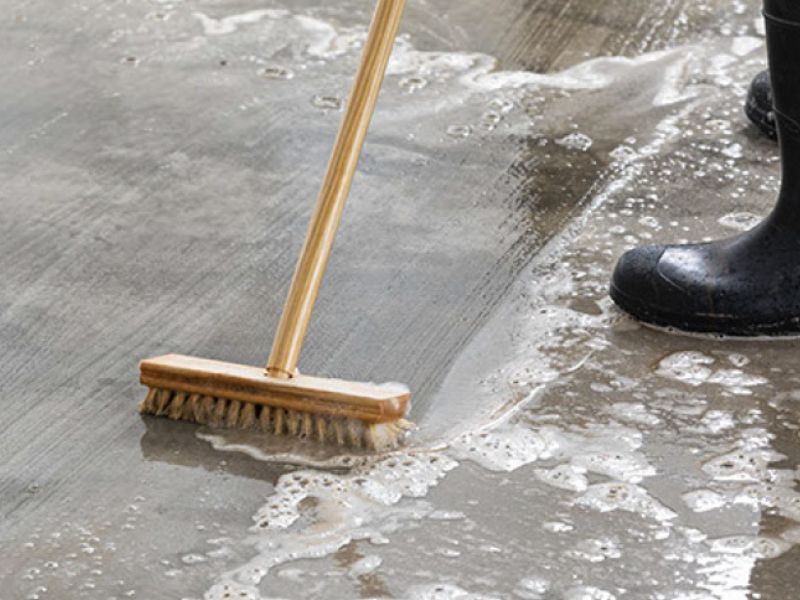
Our painting process follows manufacturer's recommendations precisely. We apply paint in two thin coats rather than one thick application. The first coat acts as a primer, soaking into the concrete surface and providing the foundation for the second coat.
Between coats, we ensure the surface has dried completely. Applying the second coat too early traps solvents underneath, causing adhesion problems later. In the UK climate, this often means waiting longer than the product instructions suggest, especially during periods of excess moisture or cold weather.
After the final paint coat has cured properly - typically 24 to 48 hours depending on conditions - we apply the concrete sealer. This timing is crucial. Sealing too early traps uncured paint underneath, while waiting too long allows contaminants to settle on the painted surface.
Interior Concrete Applications: For painted floors inside buildings, we typically use water based acrylic latex sealers. These provide excellent protection while maintaining indoor air quality. They work particularly well over standard interior paint systems and don't create the strong odours associated with solvent-based products.
Horizontal Surfaces and Driveways: Outdoor concrete surfaces face the harshest conditions. We use sealers specifically designed for exterior paint applications, often with UV protection that increases the painted surface's UV resistance by more than 60%. This helps retain colour vibrancy for years longer than unsealed surfaces.
High Traffic Areas: Commercial properties and areas with heavy traffic require the most robust protection. We often recommend epoxy-based systems that can withstand constant foot traffic, vehicle traffic, and harsh weather conditions.
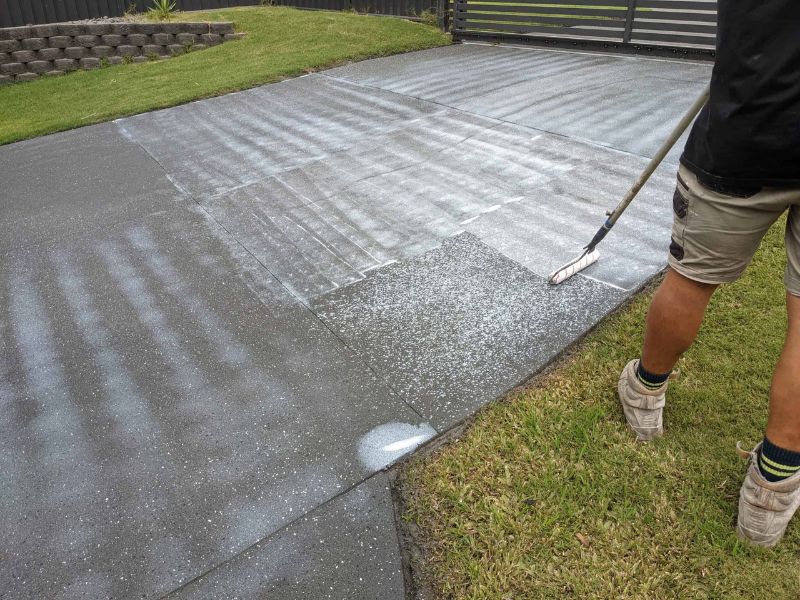
Sealing isn't a one-time application. For outdoor concrete, manufacturers recommend resealing every 2 to 5 years, depending on traffic exposure and weather conditions. We help our clients understand this ongoing maintenance requirement during the initial consultation.
Signs that resealing is needed include water absorption instead of beading, colour fading, or the appearance of small cracks or chips in the painted surface. Catching these issues early and resealing prevents major repairs later.
Regular cleaning also extends sealer life. The sealed surface makes cleaning easier by preventing grime, oil, and algae from penetrating. A simple pressure wash annually keeps most sealed concrete looking fresh.
We see several recurring mistakes when property owners attempt sealing themselves. Applying sealer in direct sunlight causes rapid drying that prevents proper penetration. Working during hot weather or high humidity creates similar problems.
Using the wrong sealer type is another common error. Exterior wall paints require different sealing approaches than floor paint systems. We match the sealer chemistry to both the paint type and intended use.
Insufficient surface preparation dooms many projects. If old paint remains or the surface isn't completely clean, even the best sealer won't bond properly. Taking shortcuts during preparation always costs more in the long run.
Modern sealers offer benefits beyond basic protection. Many include anti-slip additives that maintain safety even in wet conditions - particularly important for UK properties where rain is frequent.
Sealers also enhance the visual appeal of painted concrete floors and surfaces. They bring out colour depth and richness, making painted surfaces appear more vibrant and professional. You can choose from matte, satin, or gloss finishes to achieve exactly the look you want.
The hydrophobic properties of quality sealers help prevent mold, algae, and moss growth by limiting moisture retention. This is especially valuable in shaded areas or north-facing surfaces that stay damp longer.
While sealing might appear straightforward, professional application ensures optimal results. We have access to commercial-grade sealers not available to consumers, plus the experience to match sealer types to specific applications.
Professional application also includes proper equipment for even coverage and waste disposal of chemical products. Many DIY attempts fail because of uneven application or incompatible product combinations.
Most importantly, professional sealers understand that this is truly an easy job when done correctly, but mistakes are expensive to correct. We guarantee our sealing work because we control every aspect of the process.
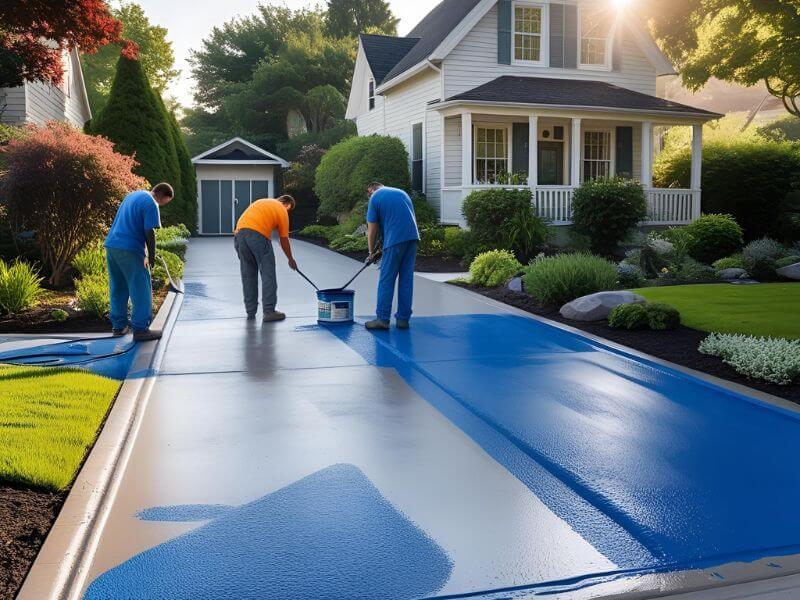
If you're unsure about any aspect of sealing painted concrete, consulting professionals saves time and money. We provide free assessments that evaluate your specific situation and recommend the appropriate sealing approach.
Signs you should call professionals include extensive cracking, evidence of moisture problems, or previous coating failures. These issues require expert diagnosis to prevent recurring problems.
For commercial properties or high-value domestic installations, professional sealing protects your investment and often includes guarantees that DIY approaches cannot match.
Ready to protect your painted concrete investment? Contact Driveway Painting today for your free quote and professional sealing consultation. We'll ensure your concrete surfaces maintain their beauty and durability for years to come.